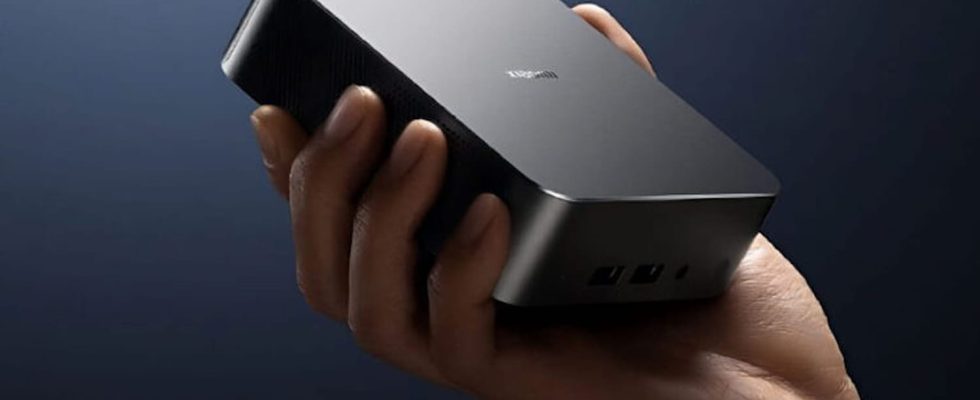A year after the release of its very first mini PC, Xiaomi is upgrading its Mini Host by equipping it with a more powerful processor and retaining its elegant case. Is this enough to compete with specialists in the genre?
Mini PCs are on the rise, as evidenced by the success of models offered by specialists such as Geekom, Beelink, NiPoGi and Minisforum, among others. And this, despite the abandonment of this market by Intel which entrusted the future of its NUC range to Asus a few weeks ago (see our article). A trend that Xiaomi also intends to take advantage of. Because if the Chinese manufacturer is best known for its smartphones, tablets, connected watches, scooters and other high-tech accessories – its catalog is particularly varied! –, it also manufactures PCs, notably the Xiaomi Mi Notebook Air and Xiaomi Mi Notebook Pro, very good quality Windows laptops, unfortunately reserved for the Asian market.
But since the end of last year, Xiaomi has also launched into stationary PCs with its Mini Host, a miniature PC clearly inspired by the competition, with a tiny case very similar to the productions of Geekom and Beelink. And at the end of October 2023, the manufacturer decided to upgrade this first opus by equipping it with a more powerful Intel processor. Thus, the Core i5-1240P – a 12th generation chip called Alder Lake – today gives way to a Core i5-1340P, a 13-generation model.e generation called Raptor Lake. If the two chips share the same 12-core architecture – 4 performance cores and 8 efficient cores for a total of 16 threads and a thermal envelope of 28 W – they are distinguished by their operating frequencies and their level 3 cache memory: 1.9 GHz in normal mode and 4.6 GHz in turbo mode with 16 MB of cache for the Core i5-1340P compared to 1.7 GHz in normal mode and 4.4 GHz in turbo mode with 162 MB of cache for the Core i5 -1240P. “Small” differences which translate into a gain of around 15% in raw performance in favor of the Core i5-1340P. No miracle, however, on the graphics side, still entrusted to an integrated module (GPU) of the Iris Ryzen 7 7840HS which is now found in several mini PCs.
The Mini Host, however, has other advantages to seduce. Starting with its ultra-compact and ultra-light square case – 112 x 112 x 38 mm for only 445 g – which has the good taste of being entirely metallic, which gives it a real premium side, like the famous Mac mini from Apple. Above all, Xiaomi has not skimped on connectivity, providing it with a modern, varied and very complete range: a 2.5 Gigabit Ethernet port, three USB-A sockets compatible with USB 3.2 Gen 2, a USB-A socket compatible with USB 2.0 , two USB8C sockets compatible with USB 4 – and therefore Thunderbolt 4 –, two HDMI 2.1 outputs and a 3.5 mm mini jack audio socket, all supplemented by Wi-Fi 6E (802.11ax) and Bluetooth 5.3 modules for connections wireless. A perfect balance. And with 16 GB of SO-DIMM DDR4 RAM at 3,200 MHz and a 512 GB capacity PCIe 4.0 NVMe SSD, the Mini Host seems well equipped to serve as a main PC for all kinds of uses – except for video game, obviously.
For the moment, we do not know if this 2023 version will be sold directly in France – the 2022 model has never been highlighted on Xiaomi’s French site -, but we should be able to easily obtain it from stores in asian line like MiniXPC. However, at around 660 euros in a 16-512 GB configuration, the Mini Host 2023 will have to face tough competition, particularly with better equipped models for a similar price, such as the Geekom A5 (AMD Ryzen 7 5800H – 32 GB – 512 GB at 430 euros), the Beelink SER6 Max (AMD Ryzen 7 7735HS – 32 GB – 512 GB at 640 euros) or even the Minisforum UM690 (AMD Ryzen 9 6900HX – 32 GB – 512 GB at 580 euros), to name just a few examples among other references. What remains is the prestige of the brand and the elegance of the case…


